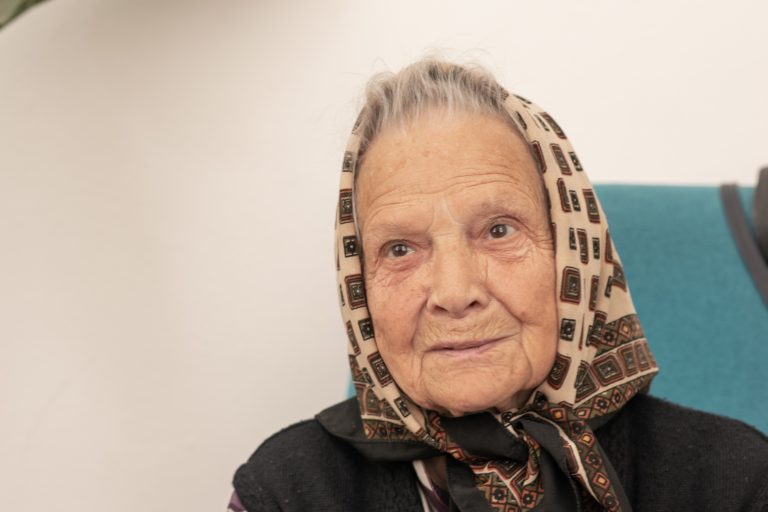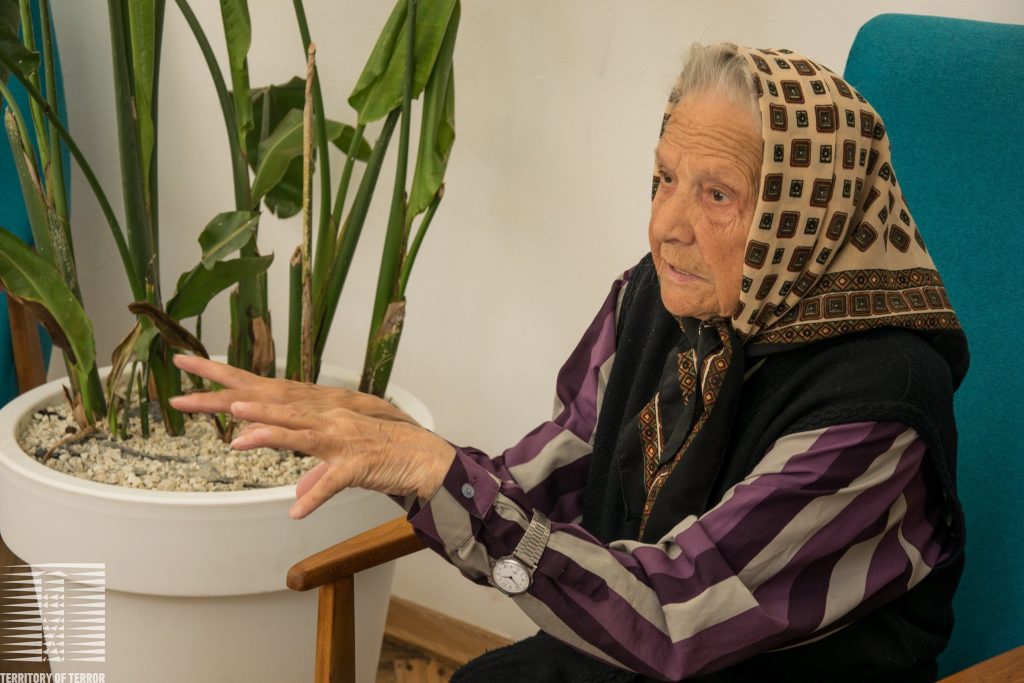Olha Kohutkevych

Olha was born in 1933 in Hrushatychi village (Sambir district, Lviv region now).
Before the war, the family lived in Przemysl where her father, Ivan Luchyshyn, owned a grocery store. Her mother, Kseniya Luchyshyn, helped her husband run the business, she also ran the household. From the age of three, Olha went to kindergarten at a church school, then studied at a Ukrainian school. Recalling the interethnic relations in the city, she noted that Ukrainians and Poles “they lived well there”, and “we communicated well with each other.”
But the war changed everything.
As a young child, the girl witnessed extreme violence – the war, the Holocaust, the Ukrainian-Polish conflict. “They [Jews] were mistreated very much at first, I remember how (because we were already in the sixth grade, we already understood everything, we were told what we could say to other, and what couldn’t), they were walking them [Jews] along the… First, they were forced to bring gold, then they were forced [to wear] some white bands with a Jewish star.” By exposing Jews to public humiliation and later to murder, the Germans also tried to show an unusual kindness to the non-Jewish population, including children. “Well, when the Germans came, they did their job (what they were told), and for civilians, they put big cauldrons in the middle of the street, I remember, they cooked food, gave us chocolates, but our father came and I took it away. He said to us, “Go home, you have chocolates at home.”
During the years of German occupation, our family helped the UPA which fought simultaneously the Nazis, the Polish underground, and the Soviet government. “We, all Ukrainians who lived around Przemysl, helped them so that they could come, bathe, change clothes (…) And as the boys came, they bathed, and mother treated them to dumplings, borscht. And they sang beautiful [songs], I remember, one guy was from Poltava, he was in the underground movement there…”
Olha recalled that Ukrainian insurgents provided assistance to Jews hiding in the city. “On the way, there was a broken brickyard, as they went out into the woods, and there the Jews hid from the Germans. And they had no connection. As our partisan went, they had some cords, I remember, they looked like… There were made of steel and they put in on your head… What were they called? Cauldrons. They were given food and water in those jars on the cords, and the Jews gave dirty dishes back (…) about twice a week they came to support those people (…) And they were saved.”
Along with the Holocaust, which took the lives of more than 20,000 Jews in Przemysl, in 1944 the territory of Transcarpathia became the scene of Ukrainian-Polish confrontation. As a little girl, Olha saw with her own eyes the horrific scenes of the bloody conflict that took the lives of many civilians. From what she saw, the girl almost went mad and could not come to her senses for a long time. “And we ran to swim in the Sian river. And, as we got there, we… Well, my dad said I lost my mind there. There were corpses of women with cut bellies floating in the water, as well as children with pierced eyes, torn, well, and everything like that. At first, we looked, looked, looked, and pointed at it to each other, and then, as the adults went there on the second day, they said, yes, that was how many villages were killed. Everyone was killed in those villages because most of the population was Ukrainian (…) And when we ran to the house and started shouting, I didn’t come to my senses for three days.”
Fleeing from ethnic violence, the family voluntarily left Przemysl for Lviv within the so-called “Population exchange” between Poland and the Ukrainian SSR. In the city of Lviv, her father got a job at the Mariya Zankovetska Theater (now the Mariya Zankovetska National Drama Theater). The fourth child in the family was born here. However, in 1949, Soviet authorities arrested her father for supporting the underground movement.
He was detained under investigation in the infamous prison on Lontskoho Street. Olha was extremely saddened by the loss of her father and with special anxiety tells us about the evening when he did not come home: “We were in the house, waiting for Dad to come for a dinner. Dad didn’t come, the window opened, all the vases fell and I started crying because I loved my dad very much. The next day my mother went to the theater and said: “What happened, Ivan did not come home?” And they say, “Well, don’t you know? They took him away at night.” Ivan Luchyshyn was sentenced to death, which was later changed to 15 years in a labor camp.

Within a year, in 1950, the Soviet regime had deported an entire family with four children to Siberia. Olha recalls the second eviction almost in detail: “One fine night, about a year later, in 1950, we were all asleep (…) They broke in, the door opened (…) My mother didn’t have time to dress everyone, in turn, there was no time for that… Well, she dressed us in what she could find. And we were immediately packed and taken downstairs (…) The “black crow” car was parked outside, a big black car. And inside there was, as it turned out later, there was already Mrs. Kovalska with Khrystia – so, there was the second family already sitting there. And we were packed there and taken to the transfer point.”
Prior to the eviction, the family was detained at a transfer point in Lviv. After the eviction, they lived without a father in a special settlement in the village. Bobrynka (Omsk region, RSFSR). Her mother soon died from overwork there.
“In the evening, I came home on a motor locomotive, or I maybe I came back on foot from the forest, there was a horse carriage near the barracks, my mother was lying on it, looking in my direction, three children were shouting around her, crying, and I approached… I don’t know how I manage not to fall there. And she died, she died right away, she was waiting for me, she just pointed at the children, and then she was gone.”
Due to various restrictions, Olha was able to return to Western Ukraine only in the early 1960s.
